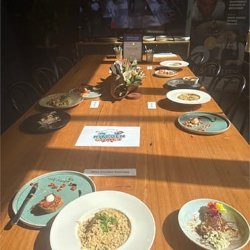At first glance the idea of looking for crushed wild animals on the road sounds obviously gross and even morbid, but some people here in the United States do follow this practice called roadkill cooking.
The steps are: finding an animal unintentionally killed on the road (there are many here in Texas as traffic is heavy and wildlife is abundant), removing the carcass from the asphalt, taking it home, skinning it, cleaning it and cooking it.
This way of harvesting food may seem a little distant from our lifestyle, maybe because the aseptic packages of already prepared meat at the supermarket help us forget the dirty work of caring for and preparing the animal. Yet, if you think about it carefully, overcoming our repugnance, what difference would there be between a farmed rabbit and a hare hit by a car? It is still a highly protein food, certainly without preservatives, coloring, steroids or other chemical food additives. And if you then happen to find a dead deer, you would have the exact same game as after hunting (another very common pastime here in Texas…) but minus the violence of voluntary slaughter.
However, I have heard that particular attention must be paid to the choice of the animal: the risk is that of potential diseases we can get from wildlife. The two basic principles, according to supporters of this particular diet, are to ask yourself: “How fresh is it?” and “In which condition is it?”
They sell books at the book shop here on the topic, with recipes and tips on how to harvest this sustainable meat.
They mention that the meat should be cooked more than normal, just as you would do with any game meat, so as to avoid bacterial infections.
Even though taking home roadkill animals has been outlawed in Texas, people seem to do it anyway.
It is obviously not a common practice or something that people do close to the city but I have heard it is quite widespread in the countryside where most accidents occur.
Eating animals that have been victims of road accidents is for the most part unregulated or hard to detect.
Even though Texans are big meat eaters, among the proponents of this style of food preparation there are also environmentalists who are critical of the industrial meat production system, true animal lovers, and theirs is a lifestyle choice in order to avoid edible meat to be wasted.
It’s not something I would try myself but I have leafed through the Roadkill Cookbook at the book shop to find out more on the topic.
On the side of Texan roads we unfortunately see deceased deer, armadillos, squirrels, badgers, foxes and small hares.
Common pets as dogs and cats were obviously not considered in the book and that would be too much to handle for most people.
I think this topic may somewhat be considered a taboo but I think it’s a way not to waste resources and in a way to honor the animal who otherwise would be thrown away by the trash trucks passing by.
I do not know the reasons why this practice was outlawed here in Texas (perhaps to avoid a health hazard?) but I think it s something which would bring us back to our ancestors way of living and harvesting food. I don’t completely oppose to it nor it is something I would do myself but I think people who feel like doing it shall have the choice to do so. At times this could be a need too as many people live close or under the poverty level in the States as I’m writing this.
*for obvious reasons I don’t include photos (which anyway I don’t have) for this one.
I kept the topic as delicate as possible but it is a thing here in the United States. In Japan I doubt.
- 2023.11.13
- Roadkill recipes, odd but tasty?






























































